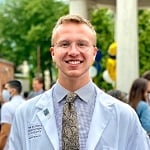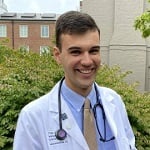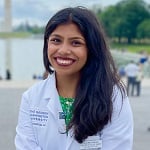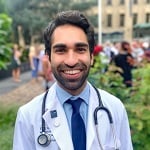“I did whatever I needed to for my child to get the proper services… you are the professionals, but I’m the mom.”
She’s the mom. It’s these humbling moments that Mary, a panelist at the annual George Washington University School of Medicine Clinical Public Health Summit on Asthma, reminds us that parents are the ultimate experts on their children’s health. Parents like Mary are among the 11.7% of families in Washington, D.C., and 7% nationally, who have a child living with asthma. From pollutants in the air to seasonal or food allergies, the triggers for asthma exacerbations are unique to each child, and there is no universal way to prevent these episodes.
We recognize that environmental factors are not the sole cause of the high prevalence of pediatric asthma. In 2021, a citywide Pediatric Asthma Registry in Washington, D.C. revealed that 66.7% of children diagnosed with asthma were publicly insured and 72.3% were Black. Compared to White families, Hispanic children also experience higher rates of asthma, while children from lower income households have been shown to have increased morbidity.
National asthma-related mortality is also of concern. Black (41.7%) and Hispanic (36.0%) individuals have made up the vast majority of asthma-related deaths in the United States, despite accounting for less than half of the American population. These data suggest that asthma-related disparities may be due to systemic inequities that are products of structural racism and discrimination in health care.
Asthma management can be challenging, especially for children. To avoid asthma exacerbations, a significant burden is placed on children and caregivers to find ways to avoid triggers, track symptoms, and navigate treatment regimens. It’s understandable why these responsibilities can feel overwhelming, especially as children with exacerbation-prone asthma tend to miss more school compared to their peers, while their caregivers must take more time off work for acute appointments and hospitalizations. These burdens further interfere with the psychology of developing children. A loss of self-esteem and identity is followed by loneliness, fear, and depression, as repeatedly missing school becomes an isolating experience.
Despite these difficulties, several strategies have been cited to improve childhood asthma management, including comprehensive asthma clinics like Improving Pediatric Asthma Care in the District of Columbia (IMPACT DC), home visits, educating school nurses and teachers, and bringing awareness to asthma through educational media such as Sesame Street. Yet, there is another strategy that deserves more exploration and may play a unique role in bringing emotional and psychosocial benefits to children with asthma, along with improving their health outcomes. This promising strategy is known as community-based support groups.
Patients enrolled in community-based support groups tend to have better health outcomes compared to those only enrolled in medical interventions. Within Black and Hispanic communities, support groups have been shown to be an effective strategy for increasing medical knowledge about chronic diseases and increasing engagement in preventive health services, such as colon cancer screenings. Similar methodologies in school-based psychoeducational programs have been shown to improve clinical outcomes, specifically for kids with asthma. Support groups serve as a platform to meet patients where they are—providing a space for families to exchange ideas for better management and find emotional support by sharing experiences with one another.
With these support models in mind, creating a space for families to educate one another is essential. Parents of children with asthma work tirelessly to understand medication regimens, triggers to avoid, and how to navigate the complex health care system to properly care and advocate for their child. Over time, parents develop a breadth of knowledge about resources, such as home visitation and medication assistance programs, in their community. This profound knowledge already exists within the communities we serve, and we must leverage it to provide guidance to families who feel lost and overwhelmed when faced with a new diagnosis.
After listening to our patients and becoming frustrated with the lack of community-based support groups in Washington, D.C. (where we currently train), we’re developing a novel approach we call Inspire. Inspire serves as a support group program that enables children and families with asthma to empower one another through their lived experiences. As parents engage more with our complicated health care system, community-based support groups can lay a foundation for parents and families to share stories, tips, and ideas about how to better advocate for their children in health care and social settings.
Inspire meetings will harbor a space that validates and centralizes familial contribution coupled with qualified and trusted professional resources. Rather than grappling with this new diagnosis alone, families and children with asthma should have the chance to bond with others in their community who’ve faced similar challenges. Sophisticated medical therapies surely have their place in the management of asthma, but we must not forget that some of the most effective solutions are simple, community-based, and collaborative.
“I’ll do whatever I can to help other parents, doctors, and anyone else to forever navigate living with asthma,” Mary says. “After all, we manage asthma—it doesn’t manage us.”
**Feature photo by Kindel Media on Pexels
Interested in other articles like this? Subscribe to our monthly newsletter
Interested in contributing to the Harvard Primary Care Blog? Review our submission guidelines

Jacob Bjork, BA, is a second year medical student in the joint MD-Clinical Research Practice Graduate Certificate Program at The George Washington University School of Medicine & Health Sciences. He graduated with his Bachelor of Arts (BA) in Cognitive Neuroscience from Washington University in St. Louis. As an aspiring physician-investigator, he hopes to provide care for and conduct research with infants and families to address how poverty and systemic inequities impact early child development.


Puja Sasankan, BS, is a second year medical student at The George Washington University School of Medicine & Health Sciences, with a scholarly concentration in Clinical Practice Innovation and Entrepreneurship. She graduated with a Bachelor of Science (BS) in Psychology from St. Bonaventure University in New York. Her professional interests include advocacy and health care innovation.
 Milan Abbi, BSPH, is a second year medical student at The George Washington University School of Medicine & Health Sciences. He graduated with a Bachelor of Science in Public Health (BSPH) in Health Policy & Management from the University of North Carolina at Chapel Hill. Milan serves as Co-Director of the Bridge to Care free clinic in Washington D.C., which provides primary care to uninsured individuals.
Milan Abbi, BSPH, is a second year medical student at The George Washington University School of Medicine & Health Sciences. He graduated with a Bachelor of Science in Public Health (BSPH) in Health Policy & Management from the University of North Carolina at Chapel Hill. Milan serves as Co-Director of the Bridge to Care free clinic in Washington D.C., which provides primary care to uninsured individuals.

Anna Hu, BS, is a second year medical student at The George Washington University School of Medicine & Health Sciences, with a scholarly concentration in Disaster Medicine. She graduated with a Bachelor of Science (BS) in Biochemistry from St. Bonaventure University in New York. Her professional interests include health care advocacy and medical education.
- Share
-
Permalink

